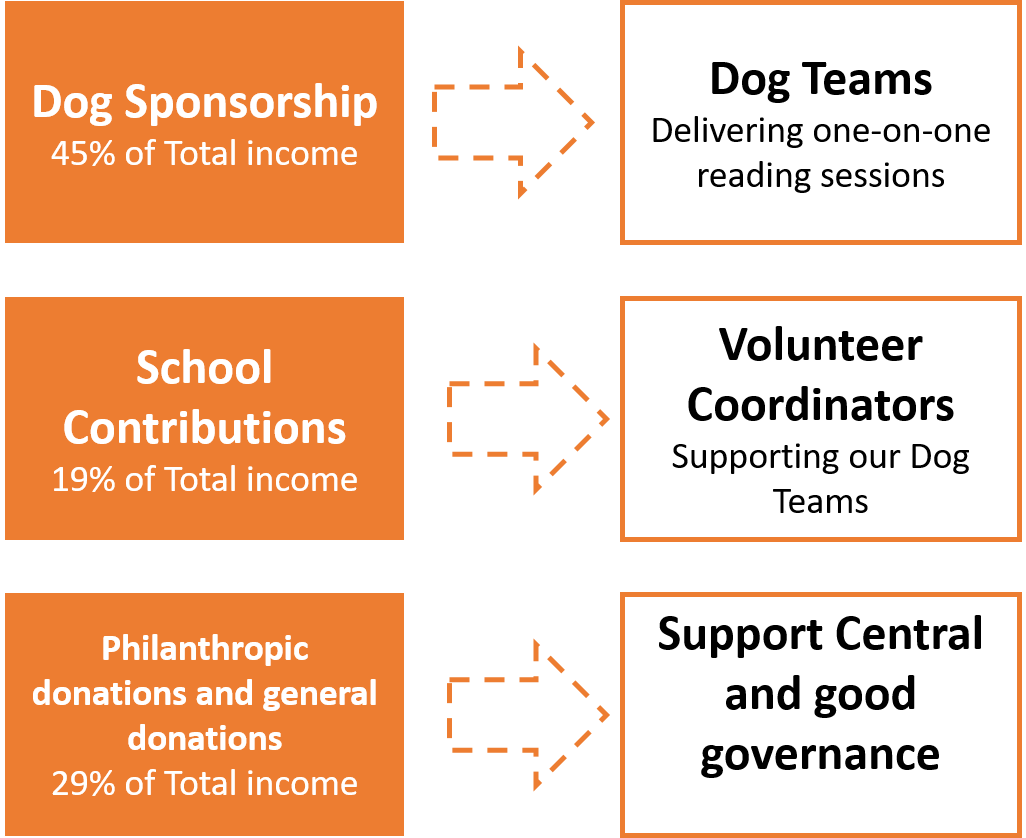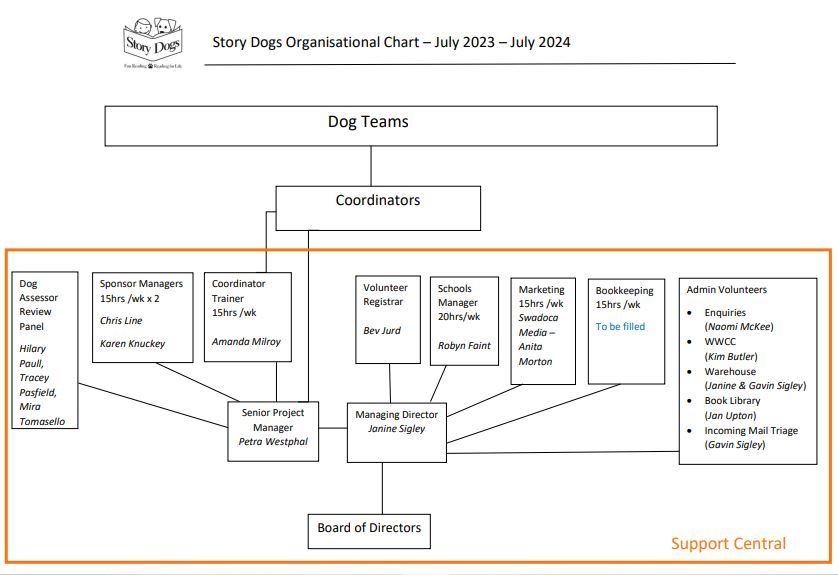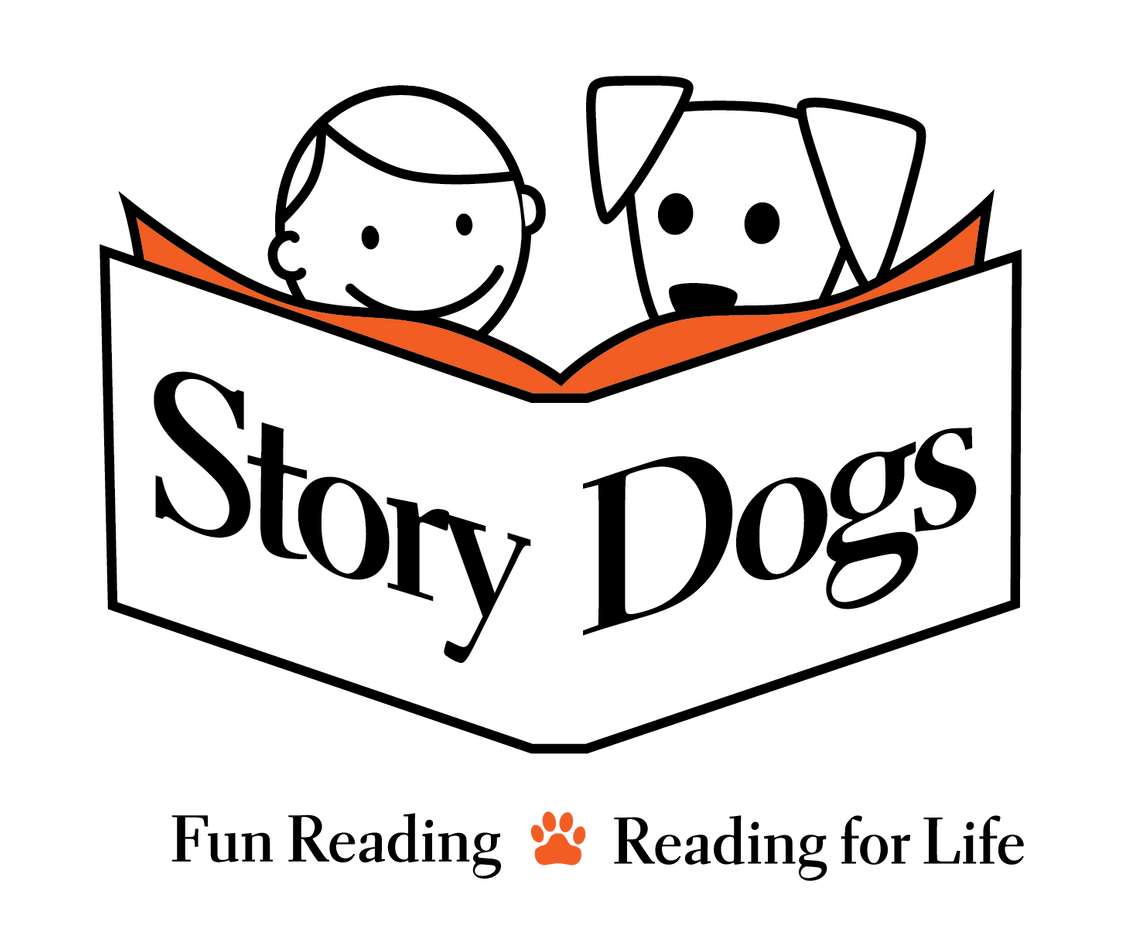Story Dogs - Good Governance
Our Goals
Short Term Goals
To be helping 5000 children by the end of 2030
Where are we at?
In December of 2025 we were helping 2870 children every week, 54% of our goal achieved.
Long Term Goals
It is a big hairy audacious goal...To have a Story Dog in every primary school in Australia!
Where are we at?
There are 6223 Primary Schools in Australia (source Australian Curriculum Assessment and Reporting Authority ACARA 2019) and the Story Dogs program is, as at December 2025, currently in 413 schools. That is only 7%. A long way to go, but we will give it our best shot.
Our Funding
Story Dogs aligns our major funding streams with our core business streams. In the financial year of 2024/25 the percentage of total income for each funding stream can be seen below.

Story Dogs receives no Government funding.
Our Board of Directors
see our Team here
Our Governance Structure
Story Dogs Ltd is an Australian company limited by guarantee.
ABN: 32 603 311 388
Registered by the Australian Charities and Not-for-profits Commission (ACNC) on 3/12/12. See our page here
Endorsed by the Australian Taxation Office (ATO) as a Deductible Gift Recipient (DGR) beginning on 07/12/16.
The public company information and financial reports are available on the ACNC website here .
The Story Dogs Constitution states that our Objectives are to:
a) Ensure no child is left behind in literacy
b) Making reading fun for children so that they become confident lifelong readers
Chart of the Story Dogs Organisation:

Risk Management
- No restricted dog breeds are used
- A person must have owned or be closely associated with the dog for at least 12 months
- The dog must be older than 12 months
- Dog teams must pass a 10 point Dog Team Accreditation Test
- We use only experienced dog trainers, who are external to Story Dogs, to accredit the Dog Teams
- Multiple dog accreditors assess dogs if necessary
- Volunteers are trained to look for the signs of their dog becoming stressed, a possible precursor for a dog bite
- It is Story Dogs Policy that volunteers are not in the playground during break times. Volunteers are directed to enter and exit the school in times when children are in class and not in the playground where the dog can become stressed due to large amounts of noise and attention.
- Volunteers never leave their dog unattended at school
- The dog is on a lead at all times when at school
- Volunteers use a Weekly Dog Interaction Review Sheet. This is a monitoring tool to determine whether the dog is showing signs of stress while at school.
- Volunteers are trained in the Story Dogs Emergency Procedure if any incident happens at school. School staff are also informed of the Story Dogs Emergency Procedure, so they can give assistance if necessary.
- Parental consent is required before a child can participate in the program. It is assumed that a child who is strongly afraid of dogs or who has behaviours which may be detrimental to dogs is not given permission.
Dog Welfare
Story Dogs is very passionate about our dogs. We are an organisation of dog lovers, Woof Woof!
We have numerous strategies in place to ensure the welfare of our dogs:
- Before starting volunteering with us every dog must undergo a health check from a Vet,
- Every Dog Team must pass the Dog Team Assessment. This assessment looks at the way the handler interacts with and treats their dog,
- The handler is expected to be calmly in charge of their dog,
- Dogs are tested wearing either a flat collar with a 1-2m webbing lead, a Martingale collar, or a well-fitting harness,
- No training collars, halties, muzzles, aversive collars or retractable leads are permitted,
- Dog are not expected or required to sit if this is uncomfortable for them, especially greyhounds or other hound breeds,
- Handlers are encouraged to talk to their dog throughout the test, reassure their dog and give positive reinforcement when appropriate,
- Absolutely no yelling, harsh commands or physical punishment (eg. lead jerking) will be tolerated. Any harsh treatment, yelling, jerking on the lead will lead to a fail of the Dog Team Assessment,
- The dog behaviour experts and dog trainers that we use to carry out the Dog Team Assessment are chosen for only using and promoting positive reinforcement techniques,
- Volunteers are trained to look for the signs of stress in their dogs and are encouraged to retire their dog if they are showing signs of stress, pain or reluctance for engaging with the program,
- Ongoing volunteer training in dog behaviour is available for all registered Volunteers,
- Our Code of Conduct includes the RSPCA Five Freedoms of Animals,
- All dogs must undergo a vet health check every year they are with our program,
- All dogs must be regularly wormed and vaccinated (or have the appropriate levels of antibodies as per the Titer test),
- Volunteers are trained to protect the dog at school from any potential harm, including the stress of students hugging our dogs. 'Pats not Hugs' is our mantra.
Volunteer Support
Nurturing, supporting, and respecting our volunteers is at the heart of Story Dogs. Our Volunteer Coordinators are the key supports for our Volunteer Dog Teams. As such we feel it is very important that our Volunteer Coordinators are also well supported, listened to and respected. Below are some of the strategies we use to support our volunteers.
- Keeping the size of the region and number of teams that a Volunteer Coordinator looks after at a manageable level is vital to their welfare and to the success of the organisation as a whole.
- Recognition and appreciation is given when appropriate and also officially at least twice during each year during National Volunteering Week and end of year recognition events.
- Feedback forms are located on the Registered Volunteer online space for volunteers to raise concerns and or give feedback.
- Access to the Managing Director via phone or email for all Volunteers to raise concerns or give feedback
- All Volunteer Coordinators have access to an internal intranet full of information to help support and manage volunteers, to manage the growth of their region, to communicate effectively and freely with all other Volunteer Coordinators and to voice concerns and give feedback.
- Grief counselling, from Rev Barbara Allen, is available to all our Volunteers at any time, for any reason
Our Code of Conduct
Annual Reports
Our Strategic Plan 2025-2030
see our Strategic Plan here

